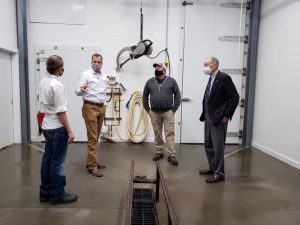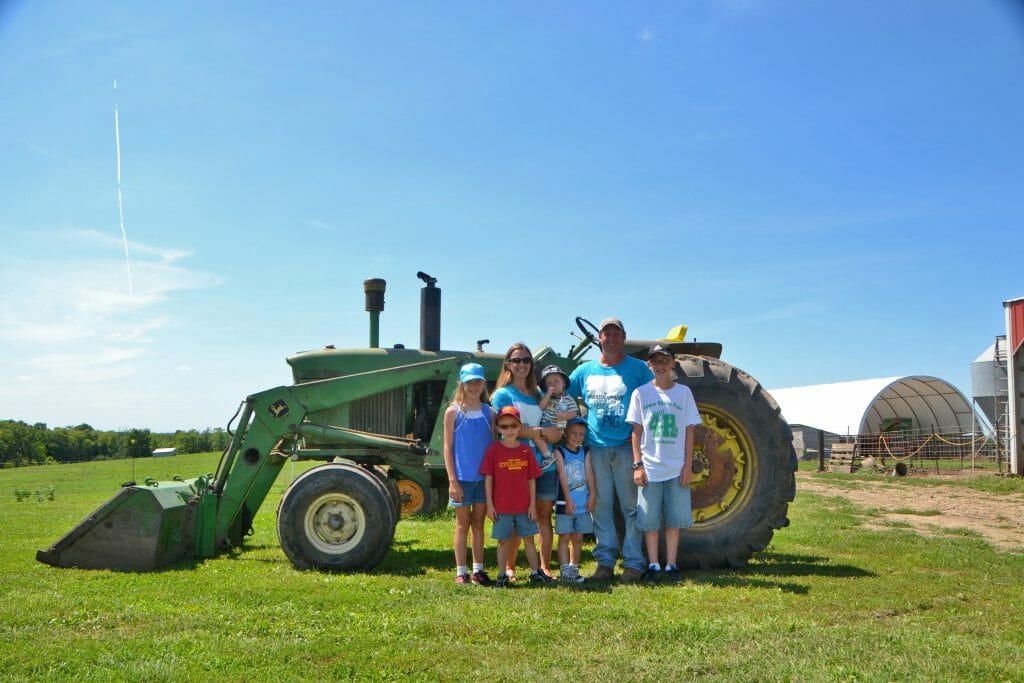Expanding Local Meat Markets
The Cooperative Interstate Shipment program means out-of-state market access
While Iowa’s large meat packing plants made national news during the height of pandemic-related food supply disruptions, something else was afoot, brimming with potential to provide a partial antidote to challenges caused by consolidation in the livestock industry.
In May 2020, the Iowa Department of Agriculture and Land Stewardship adopted the Cooperative Interstate Shipment Program, known as CIS, designating Iowa as the seventh state to enter in the program. Cooperative Interstate Shipment allows meat processed at state-inspected plants to be sold outside of Iowa.
To qualify for the CIS program, a meat processor must have fewer than 25 full-time employees and comply with all federal food safety, sanitation and facility regulations. Individual livestock producers cannot apply to the CIS program, but they can sell their meat and poultry products across state lines if they are processed at a CIS facility.

Dr. Kathryn Polking (left), Ty Gustafson (third from left), co-owner of Story City Locker, hosted Iowa Secretary of Agriculture Mike Naig (second from left) and Senator Chuck Grassley (far right) on July 16 to explain how the Cooperative Interstate Shipment program can help his small business, and others like it, to grow. (Photo courtesy of Iowa Department of Agriculture and Land Stewardship)
Prior to this, farmers had to use a USDA-inspected facility in order to sell meat across state lines. But small- to mid-scale livestock farmers could rarely access those plants, due to volume requirements and logistics tailored to larger producers. As a result, the previous rule had imposed significant marketing limitations, effectively excluding smaller farms from accessing customers and more lucrative market options in bigger Midwestern cities.
“The COVID-19 pandemic has highlighted the important role that local community meat lockers play in the food supply chain,” Iowa Secretary of Agriculture Mike Naig said when announcing Iowa’s participation in the Cooperative Interstate Shipment program. “I am excited for these meat processors to have the opportunity to grow their businesses, move more products and access new markets. It also gives consumers more access to Iowa-raised and processed meat.”
“We are looking to grow beyond what we can direct-market. The timing aligns for us, because presumably, we’re really going to need CIS in three years.” – Ashley Noonan
Currently, Iowa has 68 state-inspected facilities that are eligible to apply to CIS, 13 plants going through the process as of the writing of this article and six that have been accepted into the program.
COVID-19 Stole the Show
In July 2020, Story City Locker became Iowa’s first processor to be approved for the Cooperative Interstate Shipment program. “We initially were interested in the CIS program to fill our 15% lag in schedule,” says Ty Gustafson, co-owner of Story City Locker. “With COVID, we gained a 25% increase, and that was before the CIS program came into effect. We are now booking 18 months out, and our 2021 schedule is 100% full.”
Because more Iowa meat processing facilities are now eligible to market across state lines, Cooperative Interstate Shipment offers meat processors and farmers new opportunities to grow their businesses. In spring 2020, the coronavirus pandemic quickly upended existing meat supply chains in the U.S., revealing systemic weaknesses. For instance, when a few large processors temporarily closed due to COVID-19 outbreaks among workers, meat was in limited supply on grocery store shelves.
In the wake of those disruptions, consumers turned to local food systems to fill their demand for meat. Most local processors and livestock farmers are now experiencing unprecedented demand for their local meat products. “Processors have been so overwhelmed during the pandemic that taking anything extra on is not good timing,” says Kathryn Polking, chief of the Meat and Poultry Inspection Bureau at IDALS.
“The COVID-19 pandemic has highlighted the important role that local community meat lockers play in the food supply chain.” – Mike Naig
“Processors may say they are too busy [to enroll], but they are not always going to be this busy,” Ty says. If farmers want their local processor to enroll in the CIS program, he urges farmers to “keep having the conversation. Processors are going to keep hearing about CIS from the Iowa Meat Processors Association, and hearing from their customers will make the two ends meet.”
Kathryn adds: “The two classes of processing plants this program is best for are those close to another state border or those that are looking to put a product into wider distribution. Also, it’s not that demanding of a process.” Some processors have been shy to enroll, she says, deciding to wait and see how the kinks work out and assuming it won’t be worth the paperwork to enroll. IDALS has been very willing to work with processors in making the process as simple as possible.

Ethan Book and his family, of Crooked Gap Farm near Knoxville, pose after a PFI field day they hosted in 2016.
Crooked Gap Farm: Planning for Growth in 2021
Ethan Book owns and operates Crooked Gap Farm in Knoxville, and has been direct-marketing meat in central Iowa for over a decade. For the past 14 years, he has also hosted “The Beginning Farmer” podcast, documenting his family’s foray into farming and their questions and experiences over their years farming.
“We’ve had past requests [for our meat] from out of state due to our podcast listeners and our moderate online footprint,” Ethan says. “Shipping out-of-state is something we’ve never been able to do because of lack of USDA processing in Iowa.”
Crooked Gap Farm processes everything at Story City Locker and is now exploring taking advantage of the locker’s new CIS status. “We started an online store when the Des Moines Downtown Farmers’ Market was postponed due to COVID. We use it for local orders, pick-ups and deliveries for now,” Ethan says. “We went with the online platform Barn2Door because it fit us best, offering straightforward shipping integration which provides future possibilities.” Crooked Gap can’t keep up with its current in-state demand right now, but Ethan believes shipping meat out-of-state provides a “natural next step for us to look at in the coming year.”
“Where I see it [CIS] benefitting us is that south-central Iowa is 2½ hours from Omaha and the Quad Cities. We could sell to specific types of of restaurants in Omaha, or even Kansas City. It’s the edges we want to expand into that are within a three-hour range, not shipping to New York.” – Ethan Book
All of Crooked Gap’s animals have been scheduled for processing through 2021 and Ethan hopes to start taking advantage of CIS in mid-2021. “This gives us time to figure out shipping a bit, and work on our brand outside of central Iowa. Where I see it [CIS] benefiting us is that south-central Iowa is 2½ hours from Omaha and the Quad Cities. We could sell to specific types of restaurants in Omaha, or even Kansas City. It’s the edges we want to expand into that are within a three-hour range, not shipping to New York.”
Ashley and Brian Noonan: Three Years From Now
Ashley and Brian Noonan started raising grass-fed beef near Bernard a few years ago. Since they are located close to the Mississippi River, and a half-hour south of Dubuque, they hope to sell beef to customers in Illinois, Wisconsin and Minnesota in the future. “We are interested in CIS, but our first concern is scheduling our animals for processing in 2021,” says Ashley, who wasn’t able to get into their nearby locker and instead scheduled dates at a locker almost two hours away.
Ashley sees hope and opportunity in the fact that people are interested in local foods, and sees some momentum they can build on in the future. “The movement to know your farmer and buy from lockers is great,” she says. “We are looking to grow beyond what we can direct-market.” Ashley says she and Brian hope to sell their beef into a branded program that markets more widely. “The timing aligns for us, because presumably, we’re really going to need CIS in three years.”
The Cooperative Interstate Shipment program will help shape new and diverse markets for Iowa-raised meats, which will play a role in more livestock integration on our landscape, greater resiliency and the revival of rural communities.
